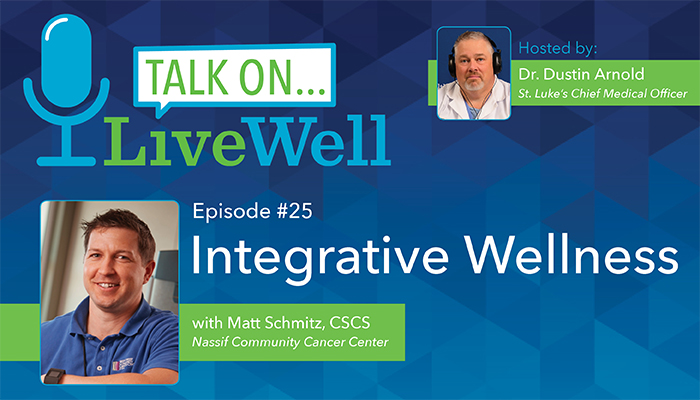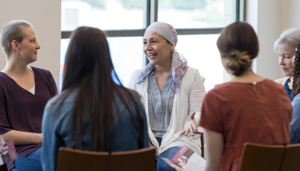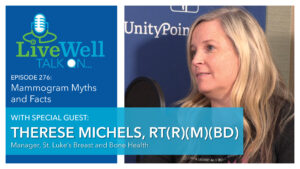Matt Schmitz, CSCS, joins Dr. Arnold to discuss various forms of integrative wellness and how they can complement traditional treatment.
Subscribe on: Apple Podcasts | Google Podcasts | Spotify | iHeart Radio | Pandora | SoundCloud | Stitcher | TuneIn
Host
Dr. Dustin Arnold
Chief Medical Officer
UnityPoint Health – St. Luke’s Hospital
Guest:
Matt Schmitz, CSCS, CES, AFT
Integrative Wellness Program Manager and Cancer Exercise Specialist
Helen G. Nassif Community Cancer Center
Transcript
Dr. Arnold: This is LiveWell Talk On…Integrative Wellness. I’m Dr. Dustin Arnold, chief medical officer at St. Luke’s Hospital, UnityPoint Health in Cedar Rapids, Iowa. Cancer treatment can lead to many unwanted side effects for patients. An Integrative approach focusing on the physical, mental, emotional, and spiritual elements are interconnected and can complement the traditional treatment. Joining me to talk about this topic today is Matt Schmitz, integrative wellness program manager and cancer exercise specialist at Helen G. Nassif Community Cancer Center. Welcome.
Matt Schmitz: Thank you.
Dr. Arnold: Okay, integrated wellness, it sounds made up. What is it?
Matt Schmitz: It’s really everything outside of your normal treatment that affects your body. So we like to think of every person, every patient entirely as a whole. You know, what else can we do to help them? So it’s the physical, the emotional, the mental, social is a big one. For some people, it’s spiritual, it’s environmental. All those things affect our health in everyday life. So anything that we can do to help that is huge. I mean, if you think about the average person, and this doesn’t even have to be diagnosed with cancer, but if we’re stressed, the first thing that happens is muscles start to tense up. We have that kind of fight or flight sense. Blood pressure might go up. After those muscles are tense, we might get a headache, things like that. Now you’re not sleeping well, you’ve got stomach disturbances. All of those things happen because of stress. You know, if there’s something we could do, like a massage that’s going to decrease that stress. Overall that person’s going to be happier, their treatment’s going to go better, everything else. So it’s integrating some of those things that we can offer patients to really kind of help with some of those side effects and also just make their entire life better.
Dr. Arnold: You know this reflects the change in medicine I’ve seen in my 25 years in practice where we’ve gone from, well there’s a gallbladder that needs to come out in room five. To there’s a person in room five that has a bad gallbladder and needs to come out. You know? And so we’ve seen that change for the better. And that was 20 years ago, if not a little bit longer. But it starting to creep into medicine where we’re starting to talk about social determinants and social capital and the variability there. And I think this kind of fits into that in the fact that you can ignore it all you want as a physician, but it’s still there. You know, so you can have the best chemotherapy regimen and radiation treatment, but if you’re not addressing the mental and emotional and perhaps spiritual aspects of that patient care, if you’re neglecting that, it’s still there, you can ignore it. It’s not going away.
Matt Schmitz: And you’re not serving your patient right either. You know, you want to treat them wholly. There’s a, I don’t know if you’ve seen it. It’s a great commercial. It’s actually a dog food commercial from Pedigree, but it shows a little girl laying in a hospital bed. It looks like, I’m going to say she’s getting some type of treatment that she gets on a regular basis. Mom’s standing next to her and the nurse walks in and the little girl, you know, starts to get frightened and she said, it’s time for treatment again. And the nurse looks at her and says, we’re going to do something different today and in runs this dog next to her. The girl’s face completely changes. She’s happy, she’s excited, she’s petting the dog. It didn’t change, she’s still going to get treatment today. But her overall feeling has now completely changed. You know, just with that dog being there, you know, that’s a type of integrative wellness. It’s pet therapy. You know, we have pets come into the radiation center twice a month. The patients love it. They’re there for treatment, but all of a sudden they’re greeted with a dog. They’re petting it and they quit thinking about what’s going on outside of there too. So it’s things like that, that anything that you can do that just to help them relax.
Dr. Arnold: That’s a great example. And it also reminds me, I didn’t stop and get dog food on the way home from the hospital last night.
Matt Schmitz: We’re almost out also.
Dr. Arnold: So I will, thanks for the reminder. Pet therapy is, I mean, there’s studies after studies that elderly patients who live alone and have a pet have less depression than ones who don’t. And that is so believable from that standpoint. So what exactly does the Community Cancer Center offer? What is the menu for this integrative wellness?
Matt Schmitz: So we really try to focus on all of those things that I listed before. You know, just the person in general, physical, emotional, mental. So we try to get a wide variety in there of different offerings and for different people. Some people may like one, they may like another, they may like all of them, but giving them something. We’ve got massage. We’ve got healing energy, we’ve got acupuncture. We’ve got different essential oil classes that we can educate people on. Mentioned pet therapy, there’s a meditation. But then outside of those ones there, I also kind of group in some of our group classes that we do. We’ve got a group art therapy class. We’ve got a horticulture healing class, so them things there are a little bit different. They’re not individual, but what they do is they help socialize. Another example, we had a nurse practitioner that worked down in the hematology oncology area that sees these patients on a regular basis, you know, once a week, once every two weeks. She came up to just help with an art class, one day. After everybody left, she said, I’ve never seen anything like that before. And I said, what do you mean? And she said, normally I see these patients, we go through everything. And she goes, I know them, I know them well. She goes, but I know their medical history. She goes, I had patients pulling out their phone, showing me pictures of their kids, their grandkids. She goes, it was a completely different atmosphere. She goes, they were happy, they were laughing, you know? And that’s the different part, you know, it’s treating that entire person and making everything go well.
Dr. Arnold: It’s a cliché, but it’s important. It really is. I mean it’s easy to say and what are some other benefits? I mean, you’ve described some of them.
Matt Schmitz: Well you know, we hit on some of those, but some of them are really just more about the side effects of treatment too. Acupuncture is one that we use for dry mouth, for relaxation, for pain management. There’s neuropathy. That’s a huge factor that goes along with chemotherapy.
Dr. Arnold: Is that still Dr. Lorenzini?
Matt Schmitz: Yes. All of our providers are certified. They specialize in their area, which is huge.
Dr. Arnold: You know, she’s a talented board certified anesthesiologist. That went and did the extra effort to learn that.
Matt Schmitz: It’s amazing, you know, and the effects that we’ve had from that, the feedback that we’ve gotten is absolutely great. You know, all of our instructors, the yoga instructors, Tai Chi instructors, things like that where it’s those group exercise classes. Most of them been teaching 10 to 20 years. They know those patients better than anybody else, you know. So it’s really all of those effects that you can and you know, the other things that go along with treatment, the anxiety, the stress, you know, even the confidence. A lot of people lose their confidence with treatment. They’re not doing all the things that they were before. They kind of isolate themselves, even from friends, which is one of these factors here, where treating that entire person gets them back to their norm. So those are some of those big effects that can have with integrative wellness.
Dr. Arnold: I mean it’s complimenting, it’s not a replacement for chemotherapy or surgery, but it’s as we talked about, you just can’t ignore it. It’s there and you should embrace it and try to maximize its benefit. Are there patients that are, I’m sure once they get started they love it. Yeah, I can imagine that. But I also can imagine that there would be patients that are reluctant to participate. How do you motivate them? How do you get them? Or are there patients reluctant to participate?
Matt Schmitz: There definitely are. You know, I would be reluctant myself to participate in some of these just because it’s like, you know, is that something that fits me? I think it’s one of those areas where especially cancer patients, they will do anything and everything that’s going to help them with that type of thing. So we always try to guide them towards the thing that’s best for them. And you know, a couple of people mentioned, you know, this is going to help with your anxiety. This is going to help with stress. And a lot of them are also on a lot of different medications. Some of these, if they can try an acupuncture, a healing energy course, massage and they notice, you know what, my anxiety is not as bad. I don’t need that medication. Can I try it without it? The doctor’s going to say, yeah, let’s try it without it. So now they’re off of one of those medications that they didn’t necessarily want to take, that’s great for them.
Dr. Arnold: We see that you do see patients, usually that classic is the 55 year old male, exercised three times a week their entire life played racket ball, whatever, after work and then has a knee replacement. Now they can’t do it anymore. And all of the sudden, now they have anxiety and depression. And you’re like, well how did this person go 55 years with no symptoms of anxiety, depression, and just wake up and have it? And what it is, is they’ve had it the whole time. They were just treating it with exercise and release of endorphins and then controlling it. And now all of a sudden they have to limit that. So I can imagine how it is a benefit. I’ve seen the kind of that in the continuum of care in my neighborhood that I live in with the patients.
Matt Schmitz: Yeah. And that’s one of those things, I think it’s kind of full circle. You know, one thing happens and then another thing happens and it continues to add up to where they’re not around the same people. The people that they saw at the gym every day. Now they’re not going to the gym. All of those people that they may not consider them best friends, but they were acquaintances, they saw them every day, they talked to them every day. Now they’re not getting that. So they kind of isolate themselves too. So yeah, it all feeds it back into that anxiety, depression, that type of thing.
Dr. Arnold: As much as we want variability in our lives, we love the tranquility, the routine. You know, I drive the same way to the hospital every day. I drive the same way at home and it just irritates my wife because it’s a longer way, but it’s the way I drive, you know? And because I just, that tranquility, the familiarity and that benefits patients, they do like that as well. Nobody likes change.
Matt Schmitz: It does, yeah. And the other good thing about these, a lot of these classes through the community cancer center, they’re either at a reduced rate to the patient cost-wise or they’re free.
Dr. Arnold: I know there’s some funding that’s been acquired to help that. Right?
Matt Schmitz: Yes. So, especially when you’re asking, you know, is it tough to get people to try some of these? It’s a free course, you know, let’s try it. And once they try it, once they’re there, they’re hooked. You know, they have fun. So it’s really good in that sense also.
Dr. Arnold: Well, this is really great information today, Matt. Again, it’s interesting. It’s necessary, you know, and I think sometimes if you ignore it, your patient is going to seek it elsewhere. That might not be in the supervised setting that you have structured. And then those are the people who are going to go to the South of the border to get, you know, coffee ground enemas for their rectal cancer. You know what I mean? And then now it becomes unsafe. And so I think it’s important to embrace this and have the entire continuum of care for cancer treatment. Again, that was Matt Schmitz Integrative Wellness program manager and cancer exercise specialist at the Helen G. Nassif Community Cancer Center. For more information, visit communitycancercenter.org. If you have a topic you’d like to suggest for our live well talk on podcast, shoot us an email at stlukescr@unitypoint.org and we encourage you to tell your family, friends, neighbors about our podcast. Until next time, be well.







